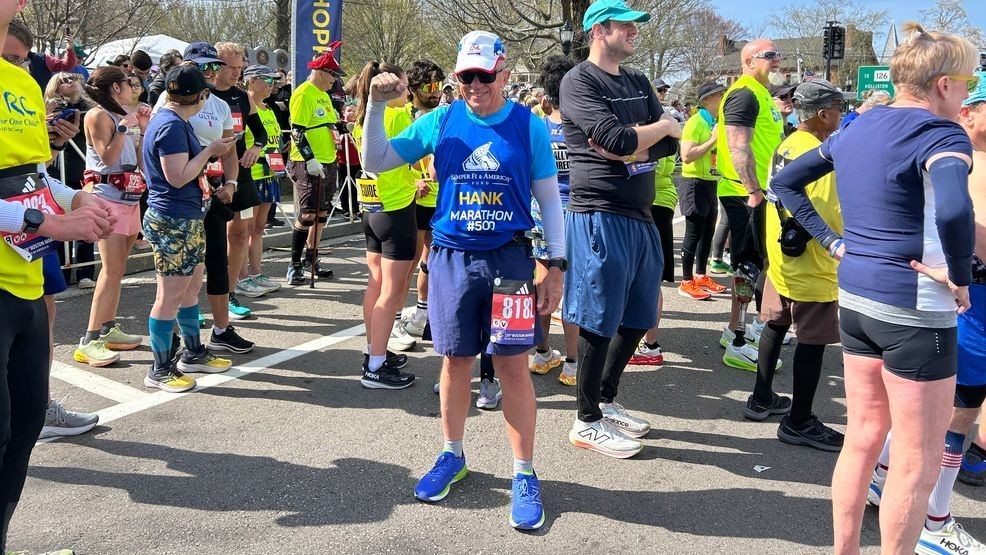Hank Donigan’s journey through the trials of running and life offers a master class in perseverance, mental fortitude, and the transformative power of community in endurance sports. As a retired Marine and a cancer survivor, Donigan recently marked a significant milestone by completing his 500th marathon at the iconic Boston Marathon. For seasoned endurance athletes, the accomplishments of runners like him resonate deeply, not merely as stories of triumph over adversity, but as reflections of the strategic mindset required to endure over long distances and difficult circumstances.
Donigan’s relationship with running emerged as a refuge during times of unrest and struggle. After serving 34 years in the Navy and Marines and grappling with post-traumatic stress disorder, he found solace in the rhythmic motion of his feet pounding the pavement and in the meditative qualities that running can provide. Each mile became a canvas on which he painted his thoughts, frustrations, and hopes—a solitary yet shared experience that countless endurance athletes understand. The beauty of running, particularly for those who have faced challenging situations, lies in its ability to create a sense of clarity amid chaos.
His mission transcended personal achievement. Over the years, he has raised more than $130,000 for veterans through marathons for Semper Fi & America’s Fund, a nonprofit organization dedicated to combat-wounded service members and their families. This dual commitment—to personal endurance and to uplifting others—speaks volumes about the intrinsic motivation that fuels an endurance athlete. Running for a cause not only offers a tangible goal but also imbues each mile with purpose, helping athletes harness their physical capabilities for something larger than themselves.
Reflecting on his role as a veteran and a witness to the struggles of fellow service members, Donigan exemplifies an athlete who has learned that the journey is not just about personal milestones but about lifting those around you. The work he did with wounded veterans, particularly in advocating for assistance when others wouldn’t, provides a testament to the resilience required not just to face one’s challenges, but to extend a hand to others. His experience teaches that as endurance athletes, we often confront physical limitations and mental barriers, but recognizing the shared human experience can galvanize us and further our progress.
Perhaps one of the more profound aspects of Donigan’s journey is his comeback from a significant health scare—a golf ball-sized tumor discovered during a routine scan. Upon surgery and subsequent radiation therapy, he could have allowed himself to be defined by his circumstances. Instead, he utilized his established training routine and fitness to accelerate recovery, illustrating what many endurance athletes know: physical conditioning offers a vital advantage in the face of adversity. His ability to return to running just weeks after surgery demonstrates a well-honed strategy of pacing, listening to one’s body, and honoring the process of recovery.
Through these experiences, the notion of pacing extends beyond the physical aspect of running into the realm of resilience. It recalls the lessons learned on long training runs: knowing when to push through fatigue and when to hold back, the understanding that each moment—whether good or challenging—offers critical insights into one’s own limits and abilities. For Donigan, his mental approach allowed him to reframe setbacks as minor obstacles rather than defining moments. This mentality isn’t merely aspirational; it’s rooted in a deep understanding of the nuances of endurance sports, where adaptability is fundamental.
At nearly 70 years old, he sets ambitious targets for himself—aiming for 50 marathons in a single year—yet he speaks of Boston as a unique experience that transcends other races. Experienced runners often share a similar sentiment; there is something distinct about particular courses, the camaraderie among participants, and the culture that envelops the event. This speaks not just to physicality or achievement but to the emotional tapestry woven through shared experiences. Each marathon becomes a milestone, rooted in memory, connection, and community, forming bonds that enrich the endurance landscape.
Such narratives, grounded and reflective, serve as reminders that each long session out on the road or trail carries its own lessons. They illuminate the shared commitment to a lifestyle defined by endurance, where the miles are not merely a path to a goal but stages for building resilience and community. It’s the quiet moments of self-reflection during an early morning run, the strategic pacing of a challenging interval workout, or the collective spirit that marks racing shoulders with fellow runners, regardless of distance.
In completing his 500th marathon, Donigan illustrates that the journey matters as much as the endpoint. Each grueling mile builds not just physical strength but mental resilience, creating an undeniable bond between community and individual effort. The counterbalance of striving for personal excellence while supporting others reflects the depth of purpose found in endurance.
The next time you set out for a long session, embrace the simple lesson that every mile can teach you: resilience is honed through experience, not just in the triumphs but in the challenges faced along the way. Recognize the power of thinking beyond oneself. In doing so, you might find not only the strength to push through but also the clarity that running is most rewarding when it bridges personal goals with the spirit of community.
